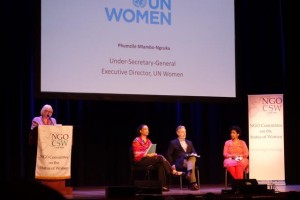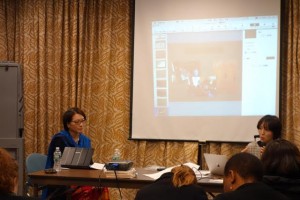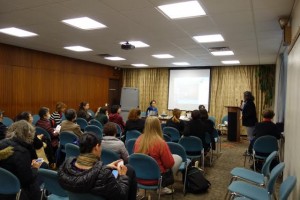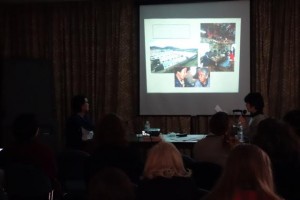Original Japanese written by Makiko Fukuzawa, Tokyo Diocese, Anglican-Episcopal Church, Japan’s delegate to the UN Committee on the Status of Women
The English below written and arranged by Heeday, based on the original Japanese
The English edited by Rev. Dr. Henry French, ELCA
Almost half a year ago, March 14—24, I made a presentation, titled “Report from Fukushima,” at an event held by the 60th UN Committee on the Status of Women (“CSW” hereafter). The presentation described what was happening in Fukushima to participants from all over the world. This CSW event provided a place to discuss how to achieve a sustainable human society, especially through the promotion of women’s rights and empowerment, as well as other human rights issues of the world from the viewpoints of women.
After five and a half years, the situation created by the disastrous meltdown at TEPCO’s Fukushima Daiichi Nuclear Power Plant remains serious. The disaster’s destruction still affects the natural environment, people’s livelihoods, relationships among people, and the future of children there. Neither TEPCO nor the Japanese government, however, is disclosing those facts appropriately. On the contrary, by forcibly lifting the residence restrictions imposed on some of the off-limit contaminated areas, the government is trying to make it seem as if the consequences of the nuclear disaster are settling down.
Intending to let people of the world know what the nuclear disaster has brought to the residents of Fukushima, especially to women, many people helped in preparing this presentation—“Report from Fukushima.” On Saturday, March 19th, at the Church Center of the United Nations in New York, I made this presentation. I hereby express my sincere gratitude to all the people who helped in its preparation.
This presentation marked a small step forward for the Anglican Episcopal Church in Japan. After the presentation, many participants at the Church Center asked me many questions and made many comments. In making this presentation, we discovered that countless people all over the world want to know what is actually happening in Fukushima. Not many groups in Japan, however, spread such information. This makes it all the more necessary for us to let the world know, continuously, what is happening in Fukushima.
The world has many countries which either already have nuclear power plants (NPP) or are planning to have them. Our presentation on Fukushima clearly communicated what is actually happening there to such countries as well. Below is a summary of the presentation and some of the questions and comments I received from participants from around the world.
Summary of the presentation
- What is the status of the Fukushima Daiichi meltdown, and what is happening now?
I showed the participants how things were around TEPCO’s Fukushima Daiichi NPP after the meltdown, mainly using photos and documents provided by the (former) Project on Nuclear Power and Radiation (No Nuke Project today). I showed them scenes of gigantic piles of flexible container bags, radioactive water expanding in volume, ghost towns, workers’ “decontaminating” towns, a kindergarten with an indoor playground because it is too dangerous to play outdoors, children with Geiger counters, and many other graphic pictures—scenes far beyond the imagination of many of those who were seeing them for the first time.
- Witnesses
What I intended to communicate most were the voices of those affected by the meltdown. Their agonies and hardships are diverse—each of them has his/her own share. Simply grouping them as “victims” does not make sense. You never begin to truly comprehend the consequences of the meltdown for the people affected until you hear their voices. Therefore, I interviewed many affected people, from many different generations, and compiled their “voices” as a major part of my presentation.
The interviewees included, among others: (1) a family currently residing in a safer place within Fukushima Prefecture after leaving behind their home in what is today a no-go zone, (2) some women currently living in temporary housing in the prefecture as evacuees from a heavily contaminated area, (3) a Buddhist priest now living at his temple in Naraha, Fukushima, where an evacuation order was recently lifted, (4) some young women currently resident in Iwaki, a less contaminated place in Fukushima, who were 15 years of age when the meltdown began, (5) some young mothers with their kids now living as refugees in Tokyo from an area affected, but not covered by an evacuation order, (6) and a female volunteer helping mothers who sought refuge in Tokyo with their children. We videoed part of their witnesses, after they consented, and I showed the videos to the participants in my presentation.
- Is nuclear power necessary?
Considering what nuclear power is doing to Japan and the rest of Asia, the former Project on Nuclear Power and Radiation of the Anglican-Episcopal Church in Japan published a booklet titled “NO-NUKE Q&A,” which discusses the many problems nuclear power creates for the environment, society, and human rights. I explained these issues to the audience, pointing out the contradiction between sustainable development and society and policies promoting nuclear power, which seriously affect people living in countries which have NPPs, as well as those people living in the wider world.
Document distributed to the audience: “NO-NUKE Q&A” (English edition)
Questions, answers, and comments from the participants
An independent radio station producer in the USA
Facts like these are not covered by most of the “common” media. There are some volunteers, concerned over radiation hazards, who are now producing a radio program in New York. In that program, a certain Japanese scientist, a resident in the US, described why he believes the Japanese government has been refusing to disclose some “truths” about its nuclear power. The scientist is deeply concerned over Japan’s nuclear power, and his concerns are recorded in the radio station’s archives. Also, an event on nuclear power is soon to be held here. Since I am an acquaintance of that radio station’s director, I can introduce you. Why not be interviewed for the radio?
A psychology professor in Arizona, US
Following the disaster of eastern Japan in March 2011, I served the people of Fukushima as a volunteer, training women affected by the disaster on how to cope with what they had experienced and how to be ready, both mentally and emotionally, for a future disaster. Now, I am trying to build up cadres of those trained women to train other women. One problem with the Japanese government is that it shows a “nice face” to outsiders like myself, while disregarding its own people who are in trouble. My mental training is meant to help women affected by the disaster build themselves up mentally and emotionally to stand against all the pressures they currently face, and to help them be prepared to face potential disasters in the future.
Her question: Can the activities of the No Nuke Project initiate some actions by and among other women from Fukushima?
My answer: For instance, we can provide help to those women from Fukushima who took refuge in Tokyo, convincing them that their choice to come to Tokyo was right. Also, we will need some legal experts as we consider bringing lawsuits against TEPCO and the Japanese government.
A priest of the Anglican Church of Korea, from South Korea
In South Korea, too, we have nuclear power issues, with the YWCA there leading the no-nuke movements. While some people are making a scene over the fact that North Korea has developed nuclear weapons, nuclear power generation itself is a very similar threat. Citizens’ efforts have successfully stopped the operation of a NPP in Busan. Now, what Japanese citizens need to do is to work on their government to disclose all its information on nukes.
A woman from Switzerland
Nuclear power is directly connected to nuclear weapons. These two must not be separated as we discuss them.
A woman from California, US
Her question: Among those “voluntary” refugees from Fukushima, are the majority of them mothers and their children living somewhere else as refugees?
My answer: It depends on whether the father can find a job as a refugee or not. If he gets a job in the new location, the whole family can live together as refugees. If not, only the mother and children live as refugees, while the father continues to work in Fukushima.
A woman from the US
Her question: Is there any way for common citizens to find out how much radiation is there? Are there any women among the decontamination workers?
My answer: In Fukushima, some common newspapers carry reports of air dose rates of radiation, while such newspaper reports are not available elsewhere. There are some women among the decontamination workers.
Written comments sent in:Are there any citizens’ protest movements against nuclear power in Fukushima? If so, are the majority of such citizens those mothers and their children living as refugees with their husbands still working in Fukushima?(From a woman in the US)
Many in the US have been concerned over and praying for Fukushima’s people ever since 2011. We pray God will give meaning to your calamities, as we continue to spread the message of the dangers of nuclear power.(Name withheld by request)
Thank you for letting us know what Fukushima’s women are doing. I did not know that their agonies and anxieties are ongoing. I believe we need to search for renewable, sustainable energy sources.(Priest of the Anglican Communion in the UK)
I’ve been praying for you. We, women should unite to stop the use of nuclear power. By no means are you selfish. All people have the right to live with safety and happiness.(Name withheld by request, from South Korea)
I send you all my love and prayer. I support your cause, since I believe in the value of life. I cheer you for your efforts to correct this wrongdoing.(A woman in South Africa)
So far, I wrongly believed that Fukushima was already safe, while those evacuees had yet to return to their hometowns. Now, I know this is not true. I am determined to tell people about what’s happening to Fukushima’s women.(A student in New York City, US)
I pray for God’s blessings on those Fukushima women affected by the meltdown. We, women of Connecticut, US, are praying for you. We are planning to switch to renewable energies like solar panels.(Name withheld by request)
I understand nuclear energy involves too many serious risks. Though the possibility of a major disaster is small, its devastations are serious once such a disaster hits.(A woman in Massachusetts, US)




